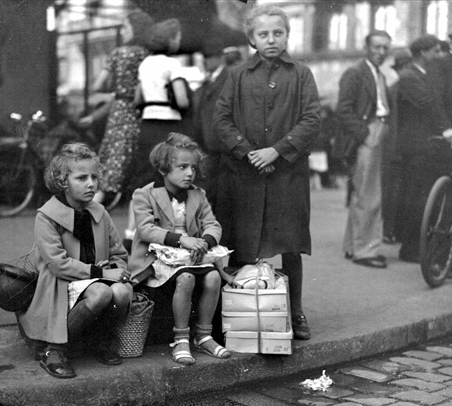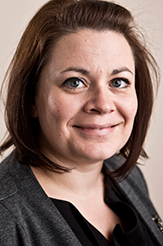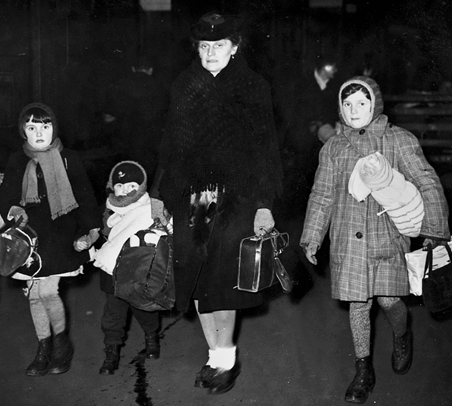France’s WWII “petits réfugiés” offered ‘a voice’ for first time

Wed, 13 Jan 2016 15:47:00 GMT
Dr Lindsey Dodd’s work on Disruptive Histories: Recovered Pasts will be jointly funded by the UK Arts and Humanities Research Council (AHRC) and the French Laboratoires d’Excellence
UNIVERSITY of Huddersfield historian Dr Lindsey Dodd (pictured) has received Anglo-French funding which will enable her to record and analyse memories of French people who became “petits réfugiés” (little refugees) during the Second World War.
 An unknown – but very large – number of French children were displaced and separated from their families as a result of the Allied bombing of France, the threat of invasion and severe food shortages in cities. Yet children’s voices have rarely found a place in the established French narrative of this period, which is dominated by experiences of resistance and collaboration in which children played little part.
An unknown – but very large – number of French children were displaced and separated from their families as a result of the Allied bombing of France, the threat of invasion and severe food shortages in cities. Yet children’s voices have rarely found a place in the established French narrative of this period, which is dominated by experiences of resistance and collaboration in which children played little part.
Dr Dodd’s new project continues themes developed in her previous research, which will be published by Manchester University Press in 2016 as French children under the Allied bombs, 1940-45: an oral history. A senior lecturer in modern European history, she has research specialisms in the theory and practice of oral history, and the experiences of children in war, particularly in France.
Now, she will build on this research as she becomes one of the interdisciplinary participants in a multi-stranded project jointly funded by the UK Arts and Humanities Research Council (AHRC) and the French Laboratoires d’Excellence (LabEx). The funding unites the AHRC’s theme Care for the Future: Thinking Forward Through the Past and the LaBex research strand Les passés dans le présent (Pasts in the Present).
 Dr Dodd has already completed one collaborative AHRC Care for the Future project, which examined the ways in which children in Britain and France during the early and mid-twentieth century were used as vehicles for ideological messages about the future.
Dr Dodd has already completed one collaborative AHRC Care for the Future project, which examined the ways in which children in Britain and France during the early and mid-twentieth century were used as vehicles for ideological messages about the future.
Now, she has made a successful bid with colleagues from Bath Spa University and Université Paris Ouest Nanterre La Défense to take part in a new, 30-month project under the Anglo-French scheme. Titled Disrupted Histories: Recovered Pasts, it incorporates varied research by experts in fields that include history, politics and ethnography who will investigate five separate case studies, linked through the use of oral history.
“All of us have an interest in history, memory, commemoration and narrative and we are all working on post-conflict and post-colonial contexts, with populations who have been displaced,” said Dr Dodd.
“We are interested in the way that unofficial histories can disrupt established narratives of the past,” she continued. In post-conflict and post-colonial settings, there is a particular need to establish a “usable past” by those in power and by societies, in order to move on.
Disruptive Histories: Recovered Pasts
 But these “usable pasts” must necessarily exclude a large number of voices, explained Dr Dodd, adding that “we are interested in digging out some of those excluded voices and those unofficial histories, to see whether they disrupt or revise the more formalised, well-established narratives”.
But these “usable pasts” must necessarily exclude a large number of voices, explained Dr Dodd, adding that “we are interested in digging out some of those excluded voices and those unofficial histories, to see whether they disrupt or revise the more formalised, well-established narratives”.
France’s quest for a usable past has included an idealisation of the role of the Resistance, a feeling of shame over collaboration with Nazi Germany and guilt over the deportation of Jews.
Civilian experience of the war and the plight of children – hungry, separated, sometimes persecuted, often afraid – struggle to find a place in France’s orthodox narrative, said Dr Dodd, and that is why her research has disruptive potential.
As part of her work on Disruptive Histories: Recovered Pasts, she will track down little-used oral history interviews of wartime childhoods in French archives to assess the disruptive quality of children’s stories. She will also carry out around 20 new interviews, focusing on issues of family displacement and separation, and working with the Archives municipales de Boulogne-Billancourt in the Paris region and the Archives départementales de la Creuse in the centre of France.
The language, history and culture of France have long been central strands in Dr Dodd’s research and she finds that her British identity is no disadvantage when she conducts interviews with French people.
“Oral history has been less widely used by French historians and so these people would be much less likely to have a professional historian of their own nationality wanting to talk to them about their wartime childhoods,” said Dr Dodd.
“It is good that people nearing the end of their lives have the opportunity to talk about things that affected them when they were young. These are parts of a national story which have often been overlooked.”







